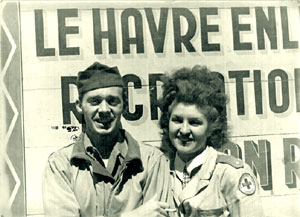|
Instead, I want to follow Wilson’s example, and offer my readers a rather odd, and oddly personalized, set of conjunctions — or perhaps better, disjunctions. Unlike Wilson, I’m no Connecticut Yankee, but I nonetheless hail from [tut] the next best thing — Central New York. And I want to try to reimagine, in brief, how this Central New Yorker might have imagined Hawai’i (most certainly not as ‘Hawai’i’, spelled with an apostrophe to represent a glottal stop) before he became such an astute — or is it abstruse? — commentator.
First, though, I want to examine a few lines of poetry that Wilson himself glosses, from Dan Featherston’s 26 Islands:
L IS FOR LEXICAL
propinquities: Hawai’i
not far from Le Havre
are there Hawfinches
there
Where?
A wee bit of translation, etymology, definition: ‘havre’ = harbor, haven (according to my Larousse, sitting here next to my keyboard). And ‘havre’ is itself (among these other things) a contraction of ‘Le havre de notre dame de grace’ (according to my Brewer’sDictionary of Phrase and Fable, sitting here next to my keyboard). ‘Hawai’i’ is ‘akin to Marquesan Havaiki, legendary homeland of the Polynesians’ (according to my American Heritage Dictionary of the English Language, sitting here next to my keyboard). And a hawfinch is ‘an Old World finch’ (according to my Merriam-Webster’s Collegiate, sitting here next to my keyboard).
If, as the title declares, L is for lexical, this little poem, but one in an alphabetic sequence of twenty-six, must signify the act of lexicography itself, or the dictionary-like prescriptive process by which a word beginning with L must participate in the predicate of this poem’s title. And if this title presumes to speak to the substance of this poem, then the poem — this spatial island of ink linked semantically and syntagmatically to its neighbors (ain’t we all?) — might provoke us to pose particularly lexical questions. (Note too that L is the twelfth letter in the alphabet-sequence, and that Featherston indicates in his prefatory ‘Primer’ that there are ‘only 12 letters in the Hawai’ian alphabet,’ which was subsequently amplified by ‘early Missionaries.’)
The obvious local lexical question, then: How are Hawai’i and Le Havre in proximity? As words, as sounds, as places? Real, or imagined? Yes, they share an uppercase ’H’ and an ’a.’’ (‘Hawfinches": another (why uppercase?) ’H’ and ’a,’ plus a ’w,’ or two v’s.) ‘Where’ in fact is ‘there"? And how is any ‘there,’ Old World or new, a function of the indigenous, as opposed to the imported, or import-able? Given the antiquated but persistent notion of French as the ‘diplomatic’ language (and the language of love), the legendary resistance in some French quarters to the very sorts of standard / nonstandard variations that typify Hawai’ian language practices, with their incumbent creolizing (and decreolizing) of Polynesian, English, Japanese, Korean, and Philippine (and Spanish and Portuguese and — ); and in light of French complicity in the very sorts of colonialist policies that brought the English, in the personage of Captain James Cook and crew, to the former Sandwich Islands in 1778, which Cook named after the Earl of Sandwich (according to my Columbia Encyclopedia, sitting here next to my keyboard); policies that also brought New England missionaries to the islands in 1820 to teach English, ‘designated the official language of the government and the medium of instruction in the schools’ in the 1890s (according to my Reader’s Digest Success with Words (309)): well, gives a reader pause, no?
I can’t answer these questions in any definitive (definitional?) sense, and I am, after all, scrutinizing but one poem in a sequence. Yet I get the impression that Featherston wishes for us only to ponder such questions, for there is no safe interpretive haven when it comes to this matter of reading and writing across cultures (regardless what may be sitting next to one’s keyboard; and note that ‘haven’ is etymologically, as one might expect, ‘probably a ’container’ for ships,’ according to my Arcade Dictionary of Word Origins, sitting here next to ... hence an apt word, I think, to adumbrate Wilson’s ‘two lurid ships [i.e., the experimental and the local] passing in the postmodern night’). And indeed, in pondering such questions, I find myself falling back, inexorably, on my own idiosyncratic lexicon — my interior sources, and unauthorized motives.
‘Nobody gets too much haven no more."
Which brings me ’round to my aforementioned (and no doubt much anticipated) work of reimagining. Herewith a randomly composed list of words / things / events / ideas I might have associated with Hawai’i oh, say, some fifteen-twenty years ago (you’ll note that I’m not proud):
islands in the Pacific, Don Ho’s ‘Tiny Bubbles,’ Hawai’ian Eye,Hawai’i Five-O,Magnum P.I., 7 December 1941, the (first) film based on Jones’s From Here to Eternity, the epic film based on Michener’s novel, Honolulu, Charlie Chan, Warner Oland as the first (talkie) Chan, Sidney Toler’s debut as Chan in Charlie Chan in Honolulu, Keye Luke as ‘Number One Son,’ sun, surf, sand, sea, sky, tropics, palm trees, coconuts, the colors blue and green, rain forest, volcanoes, aloha, 50th state, where English and Hawai’ian are spoken, lei (I had to look this one up to make sure I was spelling it right), luaus (looked it up), hula (and hula hoops), tans, brown-skinned natives, boats, bikinis, sexual promiscuity, I’ve never been there
And ditto with regard to Le Havre:
French city and port on the English Channel, where my parents were married on 7 September 1945, having to do with WWII, all things French, like my mother, where mostly French is spoken, temperate climate but cold at times, white-skinned natives, all things black & white (like the photos in my family albums), all things romantic (in a 40s sense of the word), I’ve never been there
(I take that back: there is some semblance of order here.)
|

